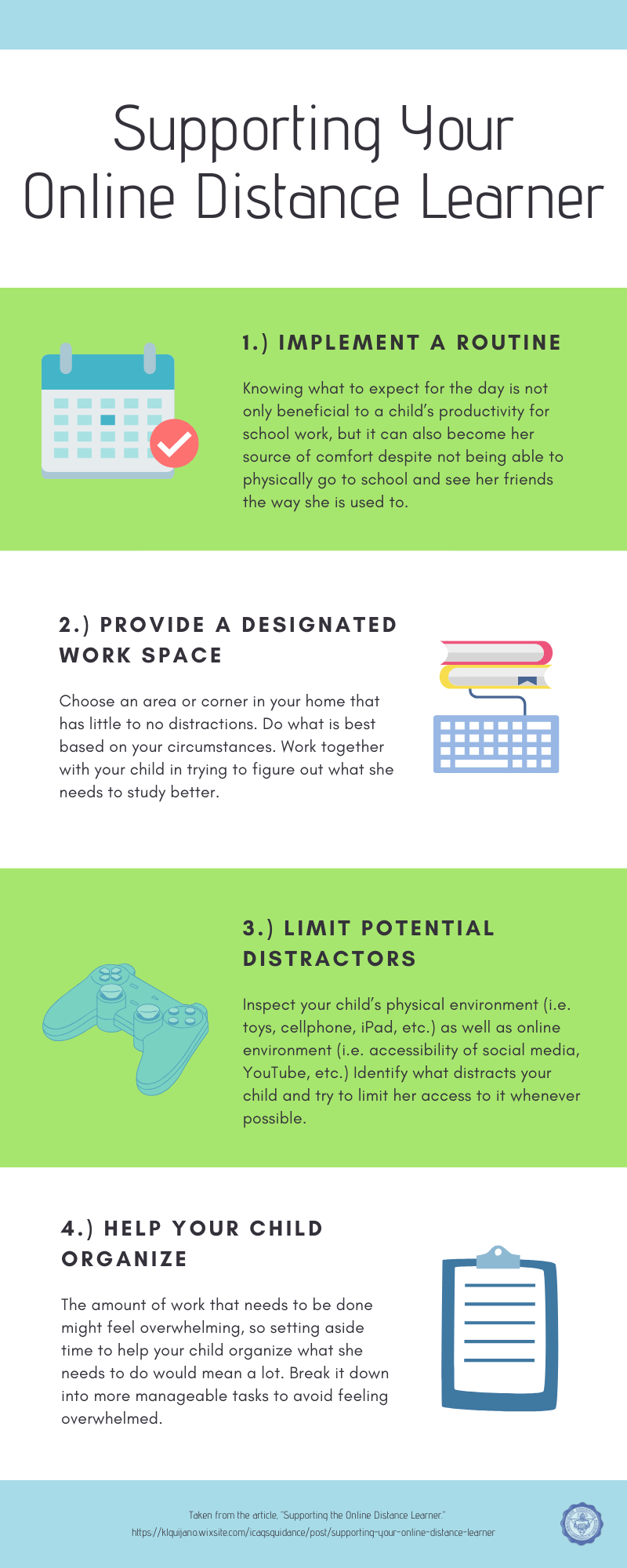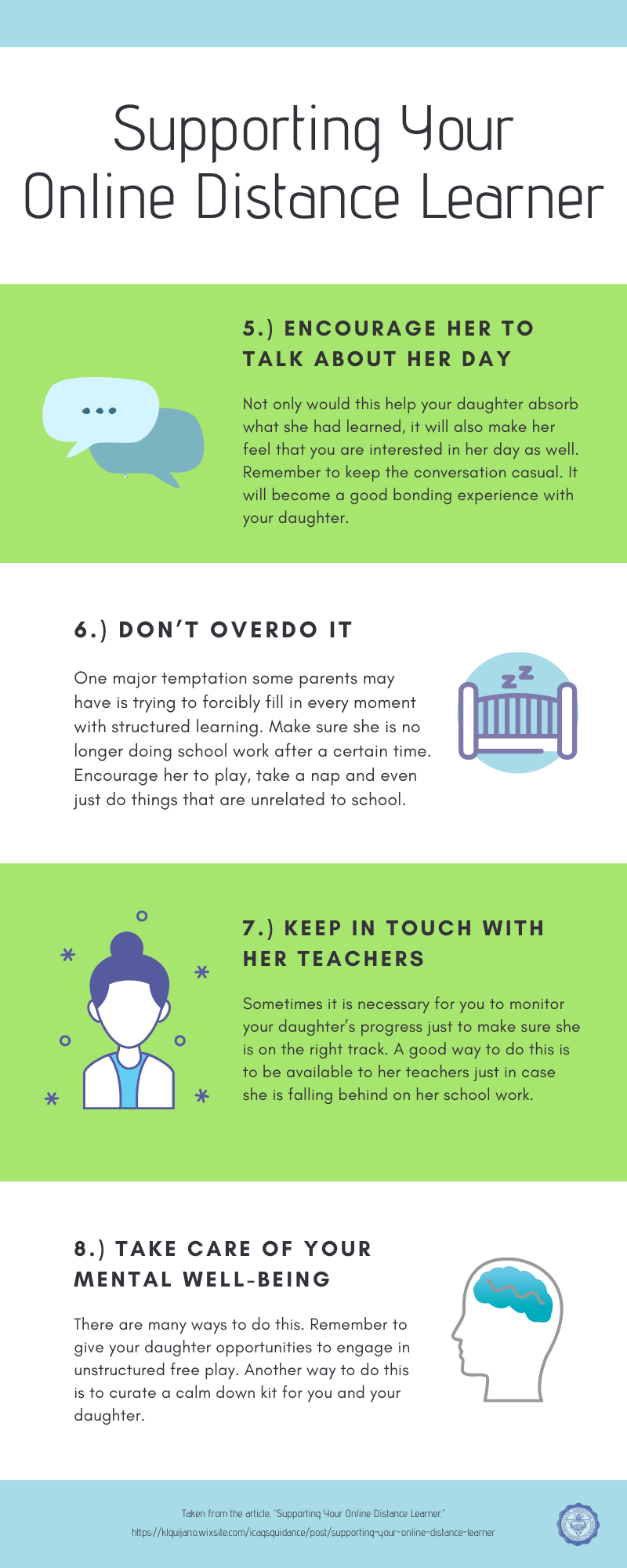
05 Jun Supporting Your Online Distance Learner
BY: Karen Anne Q. Calaquian, RGC
GS Guidance Supervisor
Parents all over the globe are doing their best to support their children despite the uncertainties and anxieties they are facing due to the COVID-19 pandemic. And with the start of the school year fast approaching this August, it has become another source of stress for those with school-aged children.
With the safety of our children at risk, the chances of having the traditional face-to-face schooling is becoming more bleak as new information about COVID-19 emerges based on those afflicted with it. This is the reason why one by one, schools are now announcing the new path they would be taking in this so-called “new normal”: online distance learning.
There are many questions left unanswered about online distance learning. As a parent, it is only natural to have doubts about its effectivity and to grapple with what it would mean for you as the parent based on your unique circumstances at home. However, it is important to note that children need to have some sort of semblance to ”normal,” and this includes being able to “go back to school” like they used to.
The good news is that there are many ways to support our children in this transition. Listed below are some of the ways you can support our online distance learners:
1.) Implement a routine
There are a lot of benefits to creating a routine with your children. Knowing what to expect for the day is not only beneficial to their productivity for school work, but it can also become their source of comfort despite not being able to physically go to school and see their friends the way they are used to.
Younger children can benefit from to-do lists with pictures as a visual guide. Older children may prefer a weekly planner where they can jot down what needs to be done in a day.
Routines are also beneficial to you as their parent or guardian because it will become easier for you to focus on other tasks that needs to be done. However, please remember that establishing a good routine with children takes time and effort, so please be patient (yet firm) when establishing the new routine. If you are a working parent, you may need to enlist the help of another adult in your home. Tell the teacher about your situation so they could also find a way to support you by following up your children more often. Also, try not to be too hard on yourself (and your children) if it is taking longer than expected to establish a routine. By doing so, you are modeling the virtues of patience, perseverance and self-discipline, all of which are necessary for them to become successful adults in the future.
2.) Provide a designated work space
Choose an area or corner in your home that has little to no distractions. During the first week of school, monitor (or ask them later) if the designated work space “helped them study” better or not. Work out the best solution based on your unique home situation. If the size of your home does not permit having a fixed work space, you can make a temporary work space in any quiet area of your home by setting up a table where they can work comfortably. If noise is unavoidable in your home, try getting noise cancelling headphones or allow your older children to work while wearing earphones (but remember to do this in moderation.) Do what is best based on your circumstances. Work together with your children in trying to figure out what they need to study better. This will also help them become more self-aware when it comes to their own needs, and encourage them to communicate with you even more in the process.
3.) Limit potential distractors in your home
Inspect your children’s physical environment (i.e. toys, cellphone, iPad, etc.) as well as online environment (i.e. accessibility of social media, YouTube, etc.) Identify what distracts your children and try to limit their access to it whenever possible. Block these websites if you must. There are tutorials available online that can teach you how to do this.
4.) Help them organize the work to be done
The amount of work that needs to be done might feel overwhelming, so setting aside time to help your children organize what they need to do (or at least send them in the right direction) would mean a lot. Of course, this also depends on the age of a child as well as their personality. (Some children are just naturally more motivated to be organized than others.) Manage your expectations and do what works for you and your children. Break it down into more manageable tasks to avoid feeling overwhelmed.
5.) Encourage them to tell you about their day
Not only would this help your children absorb what they had learned, it will also make them feel that you are interested in their day as well. It will become a good bonding experience with them. Keep the conversation casual and try not to ask too many questions that will make it seem like you are testing their knowledge. To give you an example, here are some conversation starters that you might find helpful:
• “What was your favorite school activity today?”
• [Compliment her work.] “Can you tell me more about it?”
• “I saw you [what you saw her doing]. That looks interesting. What was it for?”
6.) Don’t overdo it. Give them a break whenever they need it.
This is very important to avoid burnout. One major temptation some parents may have when teaching their children at home is trying to forcibly fill in every moment with structured learning. Make sure they are no longer doing school work after a certain time. Encourage them to play, take a nap and even just do things that are unrelated to school. After all, learning is not just limited to what is being taught in school. Children can learn so many other things, especially when they are playing or pursuing a hobby. The best outcome we would want for our children is for them to love learning simply because it is a reward in itself.
7.) Keep in touch with their teachers
While the end goal for our children is to become independent and have an innate love for learning, sometimes it is necessary for you to monitor their progress just to make sure they are on the right track. A good way to do this is to be available to their teachers just in case they are falling behind on their school work. Knowing that you and their teacher are communicating would discourage them from lagging behind in their school work.
8.) Take care of their mental well-being (as well as your own!)
There are many ways to do this. But I cannot emphasize enough that giving time to have unstructured play is very important, especially for younger children. If you’ve seen a baby playing with boxes or a toddler messing with her food, then you already witnessed what unstructured or free play is. Benefits of free play include, but are not limited to, better coping skills and self-directed executive functioning in children.
Another way to do this is to curate a calm down kit for you and your children. A calm down kit is a box filled with items that could help one cope with stress and anxiety. There are plenty of ideas online when it comes to what to put inside the kit, but do remember to make it personal for the person who is going to use it.
These are extraordinary times, and there would definitely be a lot of hurdles along the way. But with the proper mindset as well as constant communication between parent and school, we can maximize the time and circumstances thrust upon us and provide the best for the sake of our children.





May Versoza
Posted at 15:38h, 05 JuneThank you, Teacher Karen for writing this article.. This will surely help ease the pathways towards online distance learning as part of coping, adapting, and surviving to the new normal or in Filipino, “bagong kadawyan”.